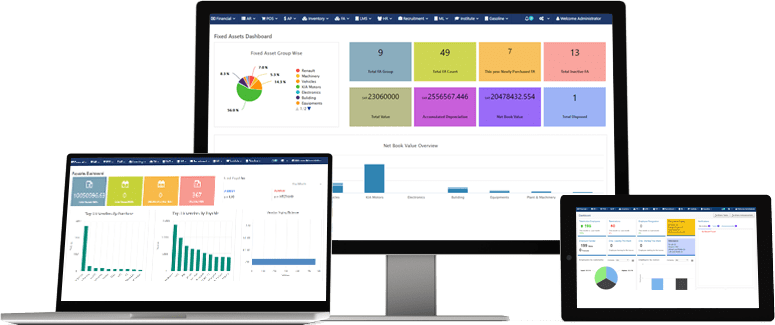ERP stands for Enterprise Resource Planning
The hype is real. The noise is great. The word ERP has been mostly heard in business arenas of today. But before going deeper in the discussions we should be able to know what actually this term refers to?
ERP refers to Enterprise Resource Planning. What is this planning all about? ERP and business are like made for each other. Starting from the planning of your business, looking for potential angles and finally the execution of your plans, everything falls in the domain of enterprise resource planning.
Name a department of your business and ERP will take care of it. It could be finance, accounting, HR, CRM, inventory and supply chain management. Everything is managed with great expertise in an effective manner.
But these are some of the very basic features and are offered by every second software company. The trend is now changing. Developers are introducing even more latest technologies like artificial intelligence in their software to increase the efficiency and proficiency of your business.
Offered Features? What does SolutionDot offer in this regard?

Increased Productivity
SDSuite ERP helps in increasing the productivity of your business by using minimum resources. Everything is presented in the shape of streamlined reporting. You can focus completely on the growth of your business without bothering much about extra management affairs.

Reduced Risks
Every process is made transparent. The software we are talking about are secure & reliable and leave no stone unturned to ensure a clear reduction in the risk percentage. You can now make sure that the business is in compliance with the regulatory requirements.

Improved Agility
The whole mechanism is so quick and effective that you get enough time to forecast your future strategies. The date is managed in real time and operations are made efficient and you can give full attention to your future business plans.

Accelerated Reporting
ERP helps in increasing the productivity of your business by using minimum resources. Everything is presented in the shape of streamlined reporting. You can focus completely on the growth of your business without bothering much about extra management affairs.

Simpler IT
Every process is made transparent. The software we are talking about are secure & reliable and leave no stone unturned to ensure a clear reduction in the risk percentage. You can now make sure that the business is in compliance with the regulatory requirements.

Better Insights
The whole mechanism is so quick and effective that you get enough time to forecast your future strategies. The date is managed in real time and operations are made efficient and you can give full attention to your future business plans.
How does an ERP System Work?
ERP is actually a combination of different applications that work together for the uplift of your business. The applications are connected with each other with the help of an integrated system. They help out each other to bring an overall positive impact for the organization. Finance, HR, inventory are some of the basic modules of an ERP and the modules can be modified according to the business needs.

Types of ERP
The implementations of ERP differ as far as their working and managing mechanisms are concerned. Generally, up till now, three different types have been observed.

Cloud ERP
The use of cloud computing for handling ERP is the most advantageous as per the requirements of the users. It is based on latest technology. The whole process is hosted by cloud computing rather than on-premises controlling of the system. These have comparatively lower upfront costs but increases the accessibility due to its connection with the internet. The security, flexibility and reliability is higher than the rest.

On-Premise ERP
The main difference lies in the way these software are deployed. Unlike cloud method which is hosted on the vendor’s servers, the on-premise erp is installed on your computers and servers locally. You have to update such systems yourself and it might require some extra time.

Hybrid ERP
What’s better than the combination of all the other available types? Yes, Hybrid ERP is a combination of both the previously discussed types. You can now enjoy both on premise and cloud options in one hybrid system. The implementations are quick, vendor independence is enhanced and time of maintaining cycles is reduced.
SolutionDot identified the factors which reflect that you need and ERP to take care of your business.
1-You are spending far too much time on your business tasks. The time required to complete all the management activities is reduced to a larger extent. The ERP offers a simple interface for the users and integrates the whole system under single database.
2-You are finding it difficult to meet the salary count of a larger number of employees. It might force you to do a difficult thing of getting rid of some of the employees, because the system is comprehensive and it can do a management work of a large number of people single handedly. You can always adjust those employees for some other tasks.
3-You are missing out on the opportunities to keep pace with the fast market trends. Give less time to your daily routine work that can be handled quite efficiently by the software and you can focus on your future business planning with a burden less mind.
Are there any size limitations?

Small Business ERP
If your company has around 250 employees, you must be considering a small business ERP as usually the systems have a lot of variations in price range as far as the size of the ERP is concerned. Cover every angle of your developing company.

Midsize Business ERP
If you have to handle around 500 employees, then a mid sized business ERP would be best for you. The built-in analytics, easy deployment, and handling of all the department operations efficiently is done here.

Enterprise ERP
The company having greater staff than 500, this would fall into a global domain as such companies would need a large Enterprise ERP. It is designed for large companies which work on a higher level.








 Saudi Arabia (English)
Saudi Arabia (English) United Kingdom
United Kingdom Global Site
Global Site